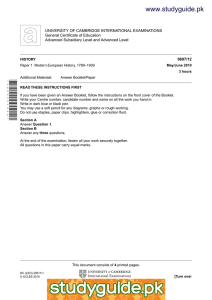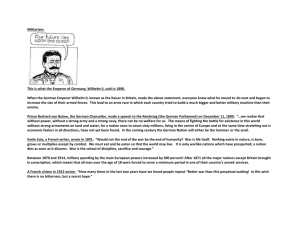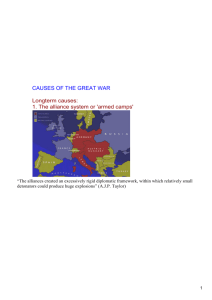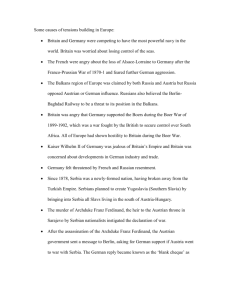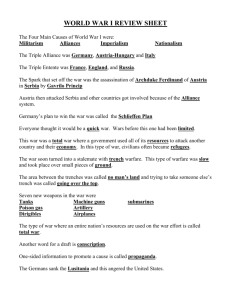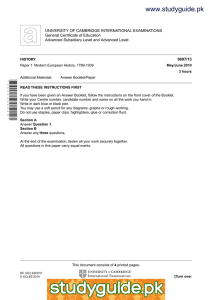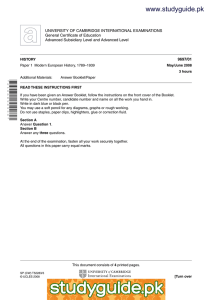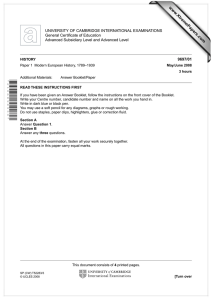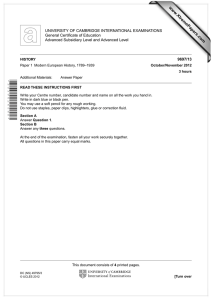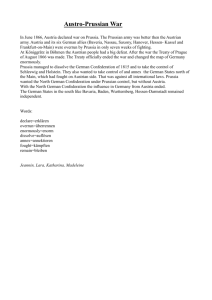www.XtremePapers.com
advertisement
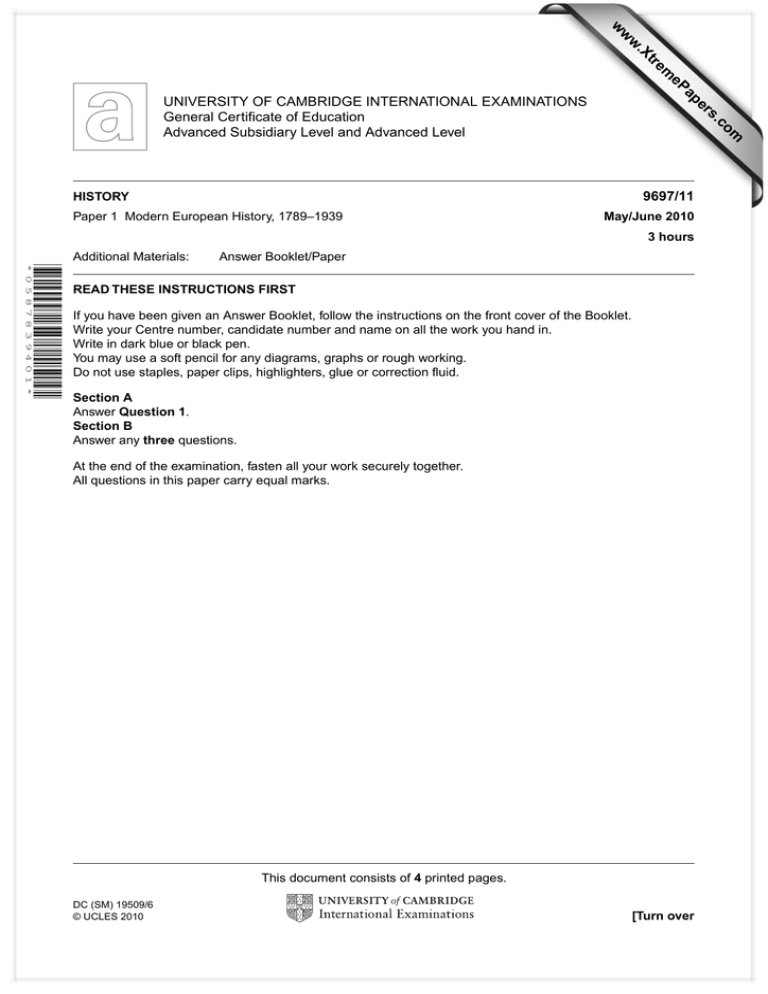
w w ap eP m e tr .X w om .c s er UNIVERSITY OF CAMBRIDGE INTERNATIONAL EXAMINATIONS General Certificate of Education Advanced Subsidiary Level and Advanced Level 9697/11 HISTORY Paper 1 Modern European History, 1789–1939 May/June 2010 3 hours Additional Materials: Answer Booklet/Paper *0587839401* READ THESE INSTRUCTIONS FIRST If you have been given an Answer Booklet, follow the instructions on the front cover of the Booklet. Write your Centre number, candidate number and name on all the work you hand in. Write in dark blue or black pen. You may use a soft pencil for any diagrams, graphs or rough working. Do not use staples, paper clips, highlighters, glue or correction fluid. Section A Answer Question 1. Section B Answer any three questions. At the end of the examination, fasten all your work securely together. All questions in this paper carry equal marks. This document consists of 4 printed pages. DC (SM) 19509/6 © UCLES 2010 [Turn over 2 SECTION A: THE ORIGINS OF WORLD WAR I, 1870–1914 You must answer Question 1. GERMANY AND AUSTRIA IN 1914 1 Read the sources and then answer the question. When answering Question 1 candidates are advised to pay particular attention to the interpretation and evaluation of the sources both individually and as a group. Source A The Austrian Ambassador yesterday delivered to Kaiser William II a confidential personal letter from the Emperor Franz Joseph, which describes the present situation from the Austrian point of view, and describes the measures which Austria plans. The Kaiser says that he is not blind to the danger which threatens Austria and therefore the Triple Alliance as a result of Russian and Serbian agitation. Of course, the Kaiser cannot interfere in the dispute now going on between Austria and Serbia, as it is not within his power. However, the Emperor Franz Joseph may be assured that His Majesty will faithfully stand by Austria, as is required by the obligations of his alliance and of his ancient friendship with that country. Bethmann-Hollweg, the German Chancellor, telegram to the German Ambassador to Austria (Germany’s ‘Blank Cheque’ to Austria), 6 July 1914. Source B Berchtold [the Austrian Foreign Minister] said that they must make up their minds whether the moment had come to reduce Serbia to permanent weakness by a demonstration of their power. So decisive a blow could not be delivered without previous diplomatic preparation. Therefore, he had approached the German Government. The conversations at Berlin had led to a very satisfactory result. Both the Kaiser William II and Bethmann-Hollweg, the German Chancellor, had most emphatically assured us of Germany’s unconditional support in the case of war with Serbia. Count Tisza [the Hungarian Premier] said that it was not Germany’s place to judge whether we should now deal a blow at Serbia or not. Personally, he was of the opinion that it was not absolutely necessary to go to war at this moment. Berchtold agreed with Tisza that it was for us, and not for the German Government, to decide whether a war were necessary or not. Nevertheless, Tisza must remember that our decision must be materially influenced by the fact that Germany’s unconditional loyalty was promised to us and that, in addition, Germany urged us to act at once. Tisza ought to weigh this fact, and also consider that a hesitating, weak policy would run us into the danger of losing the certainty of this unconditional support of the German Empire on a future occasion. Official record of the Austrian Ministerial Council Meeting on 7 July 1914. © UCLES 2010 9697/11/M/J/10 3 Source C The Austrian Ambassador declares that his Government could not modify any of its demands on Serbia. The same view is expressed in the German government and in the German newspapers. Most of the other ambassadors in Berlin came to see me this morning. They have little hope of a peaceful outcome of the present crisis. A leading official in the Russian Foreign Ministry is inclined to think that a considerable section of opinion in Germany desires war and would like to seize this opportunity to go to war, when Austria will no doubt be found more united than in the past. William II has a strong desire to give a lead as Kaiser and is filled with horror at the criminal assassination of the Archduke Franz Ferdinand. Therefore, he is less inclined to show a moderate attitude. All the evidence shows that Germany is ready to support Austria’s attitude with unusual energy. The weakness which her Austrian ally has shown for some years past has weakened the confidence that Germany places in her. Jules Cambon, French Ambassador to Germany, message to the French Foreign Minister, 24 July 1914. Source D Some Russian newspapers have claimed that the demands made on Serbia by the Austrian Government after the assassination of the Archduke Franz Ferdinand were influenced by Germany. This is absolutely false. The German Government had no knowledge of the text of the Austrian note before it was presented to Serbia, and had no influence upon its contents. It is wrong to blame Germany for taking a threatening attitude. Germany, as the ally of Austria, naturally supports the claims made against Serbia, which she considers justified. Above all Germany wishes, as she has already declared from the very beginning of the Austro-Serbian dispute, that this conflict should be localised. Count Portals, German Ambassador to Russia, message to the Russian Minister for Foreign Affairs, 25 July 1914. Source E When I visited the German Under-Secretary of State, to break off diplomatic relations, he stated that Germany always had friendly feelings towards Serbia, and that he regretted that our relations had to be broken off owing to the political situation. He blames Russia completely for the developments which have occurred because it encouraged Serbia. Russian policy will have very serious consequences for all nations. If Russia, at the last moment – just when it appeared possible that an armed conflict might be avoided – had not ordered the mobilisation of her whole forces, there would have been no war, for Germany had used her whole influence in Austria in order to bring about an understanding with Russia. Austria would have probably been satisfied with the occupation of Belgrade [the Serbian capital], when negotiations would have begun with a view to regularising the relations between Serbia and Austria. M. Yovanovitch, the Serbian Ambassador to Germany, report to the Serbian Prime Minister, 6 August 1914. Now answer the following question. ‘Germany wanted Austria to go to war with Serbia in 1914.’ Use Sources A–E to show how far the evidence confirms this statement. © UCLES 2010 9697/11/M/J/10 [Turn over 4 SECTION B You must answer three questions from this section. 2 How far was France a police state under Napoleon Bonaparte from 1799 to 1814? 3 How far do you agree that the Industrial Revolution was a disaster for the lower classes? (You should refer to developments in at least two of Britain, France and Germany in your answer.) 4 Examine the most important problems that faced Bismarck in unifying Germany during the period from 1862 to 1871. 5 Which was the more important reason for the ‘New Imperialism’ of the later nineteenth century: trade or power? 6 Why did the Bolsheviks replace the Provisional Government in Russia in 1917? 7 By 1939, how far had Hitler resolved the domestic problems that had faced the Weimar Republic? 8 Why was there a successful revolution against Nicholas II but not against Stalin? Permission to reproduce items where third-party owned material protected by copyright is included has been sought and cleared where possible. Every reasonable effort has been made by the publisher (UCLES) to trace copyright holders, but if any items requiring clearance have unwittingly been included, the publisher will be pleased to make amends at the earliest possible opportunity. University of Cambridge International Examinations is part of the Cambridge Assessment Group. Cambridge Assessment is the brand name of University of Cambridge Local Examinations Syndicate (UCLES), which is itself a department of the University of Cambridge. © UCLES 2010 9697/11/M/J/10
